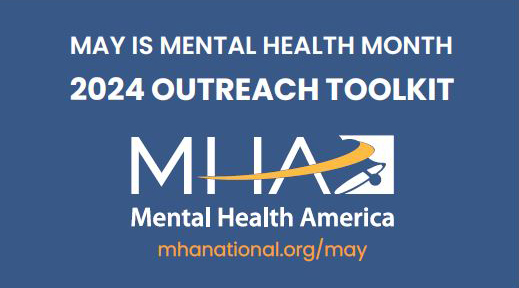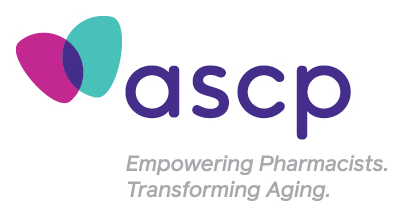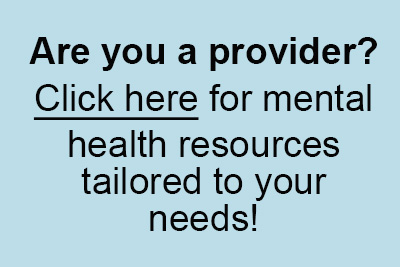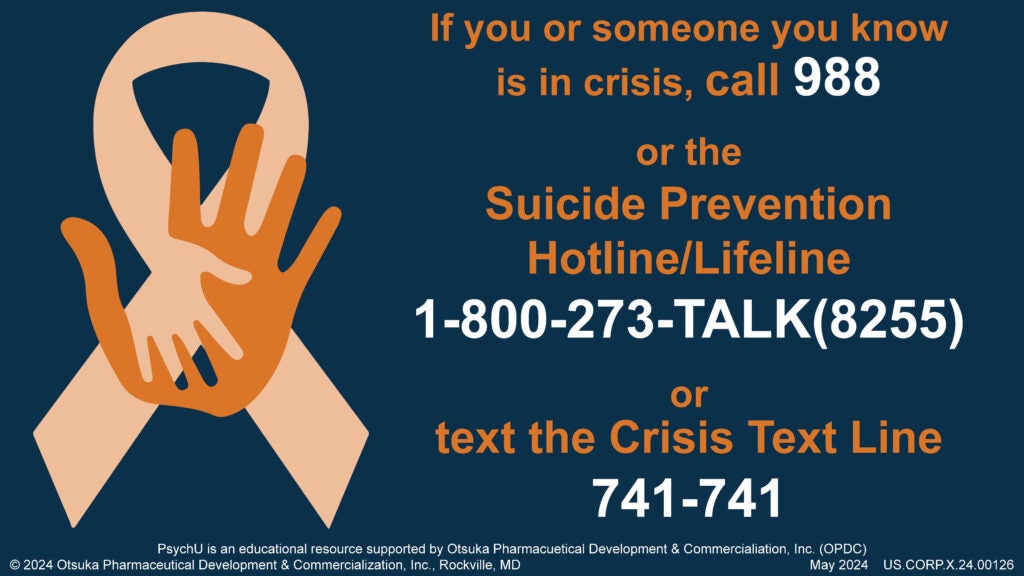
Patient & Caregiver Resource Center
Whether you live with a mental illness yourself or you provide support to someone who does, this resource center is for you. It features information that individuals can use to learn about their condition and to help them as they work with providers toward recovery. And if you are an advocate for someone with a mental illness, you will find here tools to help you become a more effective one.

I Am A Caregiver
Someone you care about has a mental illness. Educating yourself about your loved one’s mental health condition is the first step toward providing strong, informed support.

I Am A Patient
If you have recently been diagnosed with a mental health condition, you are not alone. Millions of Americans live with mental illness. In this section of the Patient & Caregiver Resource Center, you will find resources to educate yourself about your condition and to become an advocate for your own recovery.

I Am A Provider
Are you a health care professional who cares for someone with a mental illness? This section of the Patient & Caregiver Resource Center contains tools to help you in your interactions with patients and their caregivers and advocates.
For more firsthand perspective and insights from those living with mental illness, visit OPEN Mental Health
Featured Resources

2024 Mental Health America (MHA) Mental Health Month Toolkit
-
Digital Therapeutics For Mental Health Care: Benefits & Barriers
InfographicAugust 30, 2023Digital therapeutics (DTx) deliver evidence-based software interventions to treat, manage, or prevent a disease or condition. -
8 Dimensions Of Wellness Workbook: Creating Balance & Healthy Habits In Every Area Of Your Life
Downloadable ResourceFebruary 17, 2023Wellness is a multi-dimensional integration of oneself and their environment. This workbook contains information on each of the 8 Dimensions… -
2023 Mental Health America (MHA) Mental Health Month Toolkit
ArticleMay 1, 2023In preparation for May Mental Health Month, MHA is excited to release of their highly anticipated 2023 Mental Health Month…

Practical Application of Wellness Strategies for Individuals in Underserved Communities with Major Depressive Disorder (MDD) & Post-Traumatic Stress Disorder (PTSD)
-
2024 Mental Health America (MHA) Mental Health Month Toolkit
Downloadable ResourceMay 1, 2024In celebrating May Mental Health Month, MHA released their highly anticipated 2024 Mental Health Month toolkit! This year the toolkit… -
NAMI 2024 Mental Health Awareness Month Toolkit
Downloadable ResourceMay 1, 2024We at NAMI National have created this toolkit in order to support NAMI State Organizations, NAMI Affiliates, partners and ambassadors… -
PsychU Sizzle Reel
VideoApril 4, 2024Join us for this opportunity to learn and grow as we all strive to improve our mental health… together!
Support Tools

Understanding Bipolar Disorder
-
A Caregiver’s Guide To Addressing Cognitive Impairment In Mental Health
Downloadable ResourceSeptember 21, 2022Cognition refers to mental activities we all process. This includes attention, learning and memory, problem solving, planning, reasoning and judgment,… -
Creating Routines to Help You Take Your Medication
Downloadable ResourceSeptember 21, 2022Download Resource If medicine is part of the treatment plan you and your provider agreed on, taking medicine as prescribed… -
Building Family & Social Support
Downloadable ResourceSeptember 21, 2022Download Resource Having a good relationship with your mental healthcare providers is important to your wellness. So is having healthy…

-
Primary Care PTSD Screen For DSM-5 (PC-PTSD-5)
June 27, 2024
-
PTSD Checklist For DSM-5 (PCL-5)
June 27, 2024
-
2024 Mental Health America (MHA) Mental Health Month Toolkit
May 1, 2024
-
NAMI 2024 Mental Health Awareness Month Toolkit
May 1, 2024
-
The Agitation In Alzheimer’s Screener For Caregivers (AASC™) Scale
February 22, 2024
Supporting Organization Resources

American Society Of Consultant Pharmacists (ASCP), A PsychU Supporting Organization
-
PsychU Supporting Organization: An Interview With Potomac Psychiatry
InterviewFebruary 20, 2023 -
988: What’s The Scoop? A Discussion With Experts In Suicide Prevention & Mental Health
On-Demand WebinarSeptember 13, 2022 -
“Lighting Your Way”: A Digital Tool For Caregivers Of Loved Ones With The Behavioral Symptoms Of Dementia
InterviewJune 16, 2022

2024 Mental Health America (MHA) Mental Health Month Toolkit
-
NAMI 2024 Mental Health Awareness Month Toolkit
Downloadable ResourceMay 1, 2024We at NAMI National have created this toolkit in order to support NAMI State Organizations, NAMI Affiliates, partners and ambassadors… -
988: What’s The Scoop? A Discussion With Experts In Suicide Prevention & Mental Health
On-Demand WebinarSeptember 13, 2022Our experts share insights on nationwide and state-specific efforts and gaps with respect to 988, and what this means for… -
2022 Mental Health America (MHA) BIPOC Mental Health Toolkit
ArticleJuly 6, 2022Mental Health America recognizes that Black, Indigenous, and people of color have rich histories that go #BeyondTheNumbers. While there are…



